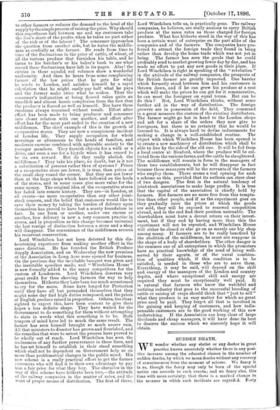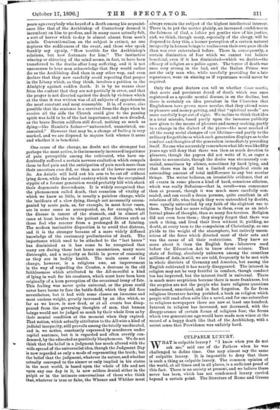SUDDEN DEATH.
WE wonder whether any statist or any doctor in great practice knows accurately whether there is any posi- tive increase among the educated classes in the number of sudden deaths, by which we mean deaths without any recovery of consciousness from the moment of seizure. We fancy it is so, though the fancy may only be born of the special notice one accords to such events; and we fancy also, this time with more certainty, that there is a marked change in the manner in which such incidents are regardcd. Forty
years ago everybody who heard of a death among his acquaint- ance like that of the Archbishop of Canterbury deemed it incumbent on him to profess, and in many cases actually felt, a sort of horror which to-day is almost absent from men's minds. Conventionalism on the subject is extinct, no one deplores the suddenness of the event, and those who speak frankly say openly, "How terrible for the Archbishop's relations, but how fortunate for him." The instinctive wincing or shivering of the mind seems, in fact, to have been transferred to the deaths after long suffering, and it is not uncommon to hear men acknowledge that they would rather die as the Archbishop died than in any other way, and even declare that they now carefully avoid repeating that prayer in the Litany which, as they think, involves a petition to the Almighty against sudden death. It is by no means clear from the context that they are not partially in error, and that the prayer is not directed against the death by violence which at the time it was written was of all subjects of apprehension the most constant and moat reasonable. It is, of course, also possible that the sentence is a survival from the days when to receive all the aids the Church could give to the passing spirit was held to be of the last importance, and men dreaded, as the brave Breton soldiers still dread, nothing so much as dying—like Hamlet's father—" unhouseled, unanointed, tin- annealed." However that may be, a change of feeliog is very marked, and we are disposed to inquire both whence it arose and whether it is beneficial.
One cause of the change, no doubt not the strongest but perhaps the most active, is the immensely increased impatience of pain perceptible among the cultivated, who have un- doubtedly suffered a certain nervous exaltation which compels them to feel pain and the anticipation of pain much more than their ancestors ever did, or than men of the lower races ever do. An Asiatic will bold out his arm to be cut off without lying down, while the actual cautery which was the recognised styptic of a former generation would probably kill with shock their degenerate descendants. It is widely recognised that the phenomenon called death, that cessation of vitality of which we know so little, is usually a painless change, while the incidents of a slow dying, though not necessarily accom- panied by acute pain, as, for example, in most fever cases, are in some cases so accompanied, as, for example, when the disease is cancer of the stomach, and in almost all cases at least involve to the patient great distress such as those feel who recover from a prolonged fit of fainting. The modern instinctive disposition is to avoid that distress, and it is the stronger because of a more widely diffused knowledge of the customary preliminaries of death. The importance which used to be attached to the "last hours" has diminished as it has come to be recognised that many are during those last hours unconscious, many more distraught, and a majority as feeble in power of reasoning as they are in bodily health. The main cause of the change, however, is a religious one, an improvement in the way of regarding the Creator, a decrease in the old faithlessness which attributed to the All-merciful a kind of lying in wait for his creatures, which must have been born originally of a keen perception of the occasional irony of fate. This feeling was never quite universal, or the pious could never have borne to face the battle-field, which they did face nevertheless, but it had with some classes an immense and most curious weight, greatly increased by an idea which, so far as we know, is now dead, or at all events has disap- peared from the governing thoughts of men, that human beings would not be judged so much by their whole lives as by their mental condition at the moment when they expired. That notion, which actually attributes to the All-wise a kind of judicial incapacity, still prevails among the totally uneducated, and is, we notice, constantly expressed by murderers under capital sentence, but it is regarded and often overtly con- demned, by the educated as positively blasphemous. We do not think that the belief in a judgment has much altered with the wide spread of the universalist idea, though the Judgment Day is now regarded as only a mode of representing the truth; but the belief that the judgment, whatever its nature, and whether actually conveyed to the sinner or only implied in his status in the next world, is based upon the whole of life and not upon any one day in it, is now seldom denied either in the pulpit or in the intimate conversations of those who think that, whatever is true or false, the Whence and Whither must
always remain the subject of the highest intellectual interest. There is, to put the matter plainly, an increased confidence in the fairness of God, a loftier yet gentler view of his justice, and, we think, though many, especially of the clergy, will be disposed to deny this, a keener perception of a certain natural incapacity in human beings to realise even their own poor ideals than was ever entertained before. There is, consequently, a certain diminution of fear which we cannot but believe beneficial, even if it has diminished—which we doubt—the efficacy of religion as a police agent. The terror of death was once very strong in the bad, and the Italian Prince was not the only man who, while carefully providing for a late repentance, went on sinning as if repentance would never be required.
Only the great doctors can tell us whether timor mortis, that acute and persistent dread of death which was once registered as a specific mental disease, is on the decline, but there is certainly an idea prevalent in the Churches that Englishmen have grown more secular, that they attend more to pleasure and money-getting, and that "spiritual needs" are more carefully kept out of sight. We incline to think that idea is a total mistake, based partly upon the immense publicity now given to the means of pleasure and money-making, partly to a change in the dialect of the pious—the most marked of all the many social changes of our lifetime—and partly to the ordinary forgetfulness which each generation displays as to the conduct and thoughts of the generation immediately preceding itself. No one who accurately remembers what life was like fifty years ago will deny that there was then as much devotion to pleasure, though the papers did not write of it, as eager a desire to accumulate, though the desire was strenuously con- cealed, sometimes by silence, sometimes .by hard lying, and that there was in all but a limited evangelical circle an astounding amount of total indifference to any but secular things. The writer believes, on irresistible evidence, that at all events in some places a kind of bard, conscious atheism, which was really Sufeeism—that is, revolt—was commoner than at present, though it was much more carefully con- cealed, and can recall a dozen persons, quite excellent in all relations of life, who, though they were untroubled by doubts, were equally untroubled by any faith of the slightest use to them. They had no more religion in them, even as an intel- lectual phase of thought, than so many fox-terriers. Religion did not even bore them ; they simply forgot that there was such a thing, and lived their lives without it, yielding, no doubt, at every turn to the compulsion of Christianity, as one yields to the weight of the atmosphere, but entirely uncon- scious of the force which directed most of their acts and was the cause of all their restrictions. They knew no more about it than the English farm - labourers used before the Education Act to know about science. That state of feeling, absolutely unknown among the countless millions of Asia, is still, we are told, frequently to be met with in whole districts of Germany and America, but among the English cultivated it has nearly disappeared. The interest in religion may not be very fruitful in conduct, though conduct too has improved, but the interest itself is universal. There is much more scepticism because there is more frankness, but
the sceptics are not the people who leave religious questions undiscussed, unnoticed, and in fact forgotten. So far from religious literature having perished, a book on religion which people will read often sells like a novel, and for one subscriber to religions newspapers there are now at least one hundred.
Interest in religion has increased, not decreased, with the disappearance of certain forms of religious fear, the forms which two generations ago would have made men wince at the record of a happy death like that of the Archbishop, with a secret sense that Providence was unfairly hard.







































 Previous page
Previous page